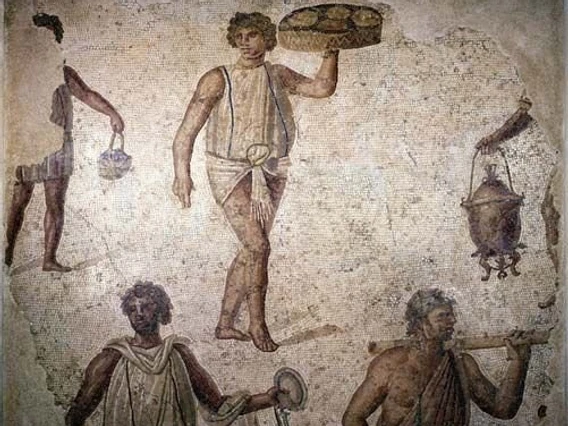
5th century BCE Greek painting from a drinking bowl showing Aegeus, one of the mythical founders of Athens, consulting the oracle at Delphi
One of the pivotal episodes in my Roman-era historical novel A Rooster for Asklepios involves a visit to the oracular shrine of Apollo at Klaros, located north of Ephesus on the west coast of Asia Minor (Turkey). In framing this episode, I drew on my own visits to the archaeological site at Klaros and my knowledge of what historians have been able to discover about how oracles functioned. The result is an imaginative reconstruction of what might have occurred during a visit to one of these shrines.
Oracles were men or women who were believed to have direct access to the deity, often while in some sort of trance. The most famous ones were known as “pythias” or “sibyls,” while the more ordinary ones were called by more generic terms like “prophet(ess)” or “diviner.” The term “oracle” was also used for the place where the oracle spoke and the message that they brought; only the context can indicate which one is in view.
Most oracles were associated with temple buildings by the time my story takes place (first century CE), but in earlier times they often plied their skills at unusual or mysterious sites in nature such as caves or grottos where gods or spirits were believed to reside. Many oracular sites are mentioned by ancient authors, and many more were no doubt buried in the trash bin of history.

Ruins of the Temple of Apollo at Delphi (Greece); the oracle spoke from a chanber in the center of the building where gasses arose from a crevice in the rock

Ruins of the oracular shrine of Apollo at Didyma (Turkey); the oracle spoke from a separate building inside the temple that held a sacred well
The most famous oracles were the ones at Delphi and Dodona in Greece, Cumae in southern Italy, and Didyma and Klaros in western Turkey. (Klaros is the one that appears in my novel.) Apollo was the most common divine spokesman at these sites, but oracles existed for other deities as well, including native or indigenous (non-Greek) gods.
In classical Greece, cities used to send official delegations to an oracle (especially the one at Delphi) to seek divine guidance regarding matters of public import when the citizens or leaders were divided over what to do. By the time of my story, most of the people who visited oracles were individuals seeking advice or assistance about some sort of personal problem. Questions that are known from ancient records address topics like marriage, children, jobs, money, health, travels, and similar causes of anxiety. Special purifications and offerings were typically required for those who wished to consult the oracle, as described in my novel.

Aerial view of the temple of Apollo at the oracular shrine of Klaros (Turkey)

Underground chamber at Klaros where the oracle received and answered messages
Oracles did not live in the temples but came there periodically to receive petitions. When the oracle was present, he or she was typically hidden from view in some sort of sacred chamber, where requests were delivered to them by priests or assistants.
Oracles used a variety of means to discern the will of the deity. Some took intoxicating drugs or inhaled gasses that placed them in a trance, while others used less spectacular means like casting lots, reading the entrails of sacrificed animals, or listening to the sound of rustling leaves or crashing cymbals. Some gave clear and direct answers while others delivered their messages in riddles or vague poems that could be interpreted in multiple ways. The latter is what happens in my novel, creating an expectation of divine action that helps to drive the story forward. To find out if the oracle comes true, you’ll have to read the book!



